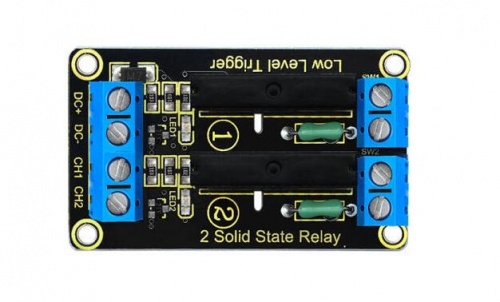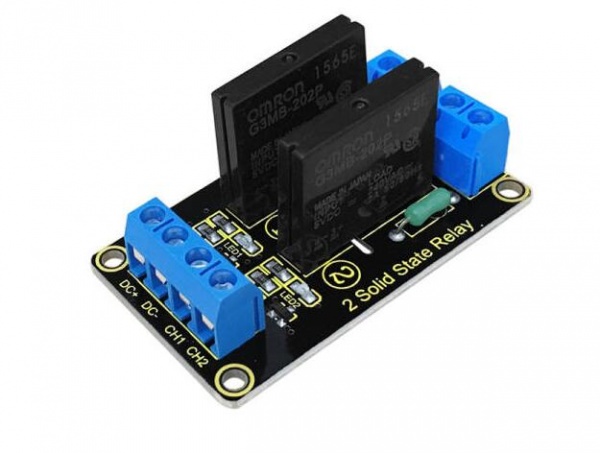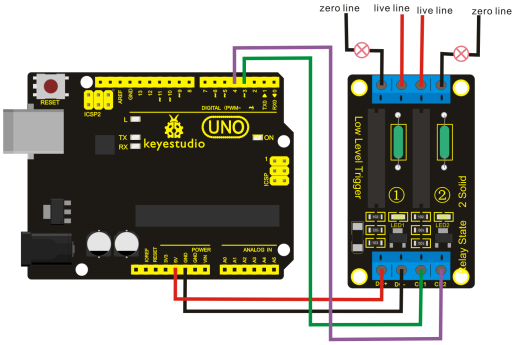Ks0264 keyestudio Two-channel Solid State Relay Module: Difference between revisions
Keyestudio (talk | contribs) |
Keyestudio (talk | contribs) No edit summary |
||
| Line 5: | Line 5: | ||
<br> | <br> | ||
==Introduction== | ==Introduction== | ||
Keyestudio two-channel solid state relay is | Keyestudio two-channel solid state relay is '''active at LOW''' level, that is to say, the input control signal is the low level (0-1.5 V), the relay is on; while the input control signal is high level (3-5 V), the relay is off. <br> | ||
Solid State Relay is a new kind of contactless switching device which is composed of all solid state electronic components. Compared with the electromagnetic relay, | |||
The output control terminal of | Solid State Relay is a new kind of contactless switching device, which is composed of all solid state electronic components. <br> | ||
<br>[[File:KS0264-2.jpg| | |||
Compared with the electromagnetic relay, it has higher reliability, with the features of non-contact, long service life, fast speed and less outside interference. <br> | |||
<span style=color:red> The output control terminal of keyestudio solid-state relay must be connected to the circuit, '''can only be AC (Alternating Current)''' , so that the solid state relay can be disconnected normally. </span><br> | |||
<br>[[File:KS0264-2.jpg|600px|frameless|thumb]]<br> | |||
<br> | <br> | ||
==Performance Parameters== | ==Performance Parameters== | ||
* Electrical parameters:<br> | * Electrical parameters:<br> | ||
{| class="wikitable" border="1" | {| class="wikitable" border="1" | ||
|- | |- | ||
| Line 41: | Line 46: | ||
<br> | <br> | ||
==Connection Diagram == | ==Connection Diagram == | ||
<br>[[File:KS0264.png| | <br>[[File:KS0264.png|800px|frameless|thumb]]<br> | ||
<br> | <br> | ||
Revision as of 11:48, 3 June 2019
Keyestudio Two-channel Solid State Relay Module
Introduction
Keyestudio two-channel solid state relay is active at LOW level, that is to say, the input control signal is the low level (0-1.5 V), the relay is on; while the input control signal is high level (3-5 V), the relay is off.
Solid State Relay is a new kind of contactless switching device, which is composed of all solid state electronic components.
Compared with the electromagnetic relay, it has higher reliability, with the features of non-contact, long service life, fast speed and less outside interference.
The output control terminal of keyestudio solid-state relay must be connected to the circuit, can only be AC (Alternating Current) , so that the solid state relay can be disconnected normally.
Performance Parameters
- Electrical parameters:
| Voltage | Static Current | Working Current | Trigger Voltage | Trigger Current | |
|---|---|---|---|---|---|
| Channel 1 | DC 5V | 0mA | 12.5mA | 0-1.5V | 2mA |
| Channel 2 | DC 5V | 0mA | 12.5mA | 0-1.5V | 2mA |
- Output port: AC240V/2A
Connection Diagram
Sample Code
int BASE = 3 ; //The first relay I/O port
int NUM = 2; //Total number of relay
void setup()
{
for (int i = BASE; i < BASE + NUM; i ++)
{
pinMode(i, OUTPUT); //Set the digital I/O port to output
}
}
void loop()
{
for (int i = BASE; i < BASE + NUM; i ++)
{
digitalWrite(i, LOW); //Set the digital I/O port outputs to "low", that is, gradually open relay
delay(200); //delay
}
for (int i = BASE; i < BASE + NUM; i ++)
{
digitalWrite(i, HIGH); //Set the digital I/O port outputs to "high", that is, gradually close relay
delay(200); //delay
}
}
Result
Wiring as the above diagram, after powered-on, the two-channel solid state relay is first connected and then disconnected successively, repeating alternately.
Resource
- PDF:
https://drive.google.com/open?id=1L_9MQoeBzdrVKn2q5G62mv0ir8x0VkjH
- Code:
https://drive.google.com/open?id=1TxF-EaLsqfYS5skqDLzFEYyJ-qQ-OkHG
- VIDEO:
http://video.keyestudio.com/ks0264/


